Despite its relative youth, America has played an outsized role in modern military history. From the colonies' improbable victory against the British Empire, to the sacrifices made by "The Greatest Generation", to the subsequent ill-fated engagements that left the country grappling with its role in the world of geopolitics, these 10 American wars have shaped the nation–and the world.
For each of the 10 major wars, we chose a single book that sheds light on the soldiers, politicians, and civilians who played a pivotal role in each of these history-defining affairs. Whatever your perspective on the history of American warfare, it is sure to be enlightened by the books on our list.
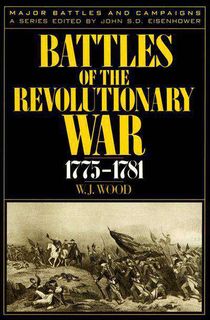
Battles of the Revolutionary War, 1775–1781
Let’s start with the war that shaped American history forever. The American Revolution has long been considered a miraculous win for the Colonies over what was the dominant military and geopolitical force of the age: the British Empire.
Related: 7 of the Best American History Books
Mainstream historians frame the rebel victory as being predicated on the revolutionaries' sheer will to outlast the onslaught of the British, yet in their seminal work on the Revolutionary War, Wood and Eisenhower argue that victory actually came about as a result of the superior strategies, tactics and leadership employed by the generals and soldiers alike of what would come to be known as the United States of America.
In this gripping account, the authors delve deep into the battles of Bunker Hill, Trenton, and other key engagements that shaped the war's outcome. They explore the broad strategies and nitty-gritty tactics, and include dozens of detailed maps and illustrations for history buffs to feast their eyes on.
Battles of the Revolutionary War will transform how you think about America's war for independence, and provide a fresh perspective on the planning and methods employed in that lofty undertaking.
Further Reading: 10 Revealing Revolutionary War Books

Andrew Jackson and the Miracle of New Orleans: The Battle That Shaped America’s Destiny
Despite its relevance to a young nation, the War of 1812 is often overlooked due to its proximity to the American Revolution. Nonetheless, it was a pivotal American war, as young and untested strategists found themselves up against the British Navy.
Famously noted as one of the greatest military forces in the world, the British Navy believed they would easily debilitate their former colony via the Mississippi River. It seemed a straightforward task, as the British had just been victorious over Napoleon and his forces. What they couldn’t possibly foresee were the leadership skills and ingenuity of General Andrew Jackson.
Jackson was able to rally the divided inhabitants of New Orleans: Frenchmen, Native Americans, freed slaves, pirates, and Kentucky woodsmen alike. They were able to fight against the British and save the newly formed United States—even salvaging the Louisiana Purchase. He was able to successfully remove any possibility of the British seizing western control, paving the path to western expansion in the United States.
Kilmeade and Yaeger provide maps and detailed descriptions of strategies, in order to stress General Jackson’s resilience and acknowledge the significant wins that allowed the nation to reinvent itself and set a new precedent.
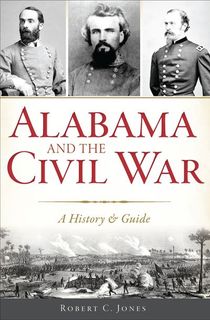
Alabama and the Civil War
We will now touch upon the bloodiest war on American soil: the Civil War. As the United States grew, slavery became increasingly abhorrent to many of its citizens. The Compromise of 1850, which allowed California to enter the Union as a free state while also passing a new version of the Fugitive Slave Law, became a flash point for the Civil War.
While each of the 34 states played a role in the Civil War, none were quite as pivotal as Alabama. Central Alabama had an established manufacturing infrastructure, unusual amongst the Southern states. Northern Alabama was a major site for Union raids, and southern Alabama contained the Battle of Mobile Bay. A number of important Civil War figures called Alabama home, such as the Confederate cavalry commander, Major General Joseph Wheeler.
Jones presents a historical guide that not only soars through some of the most important events of the Civil War, but also examines the people and places in Alabama that shaped the war in unparalleled ways.
Further Reading: 12 Essential Civil War Books

The First World War
Talented historian John Keegan captures the story of the First World War in just over 400 pages. The relative peace and prosperity of the Victorian era was quickly brought to an end by the assassination of Archduke Franz Ferdinand, unleashing demons such as mechanized warfare and mass death, and helping to cultivate the modern world. World War I was not just a military turning point–the new ideas explored during this time of conflict shaped our art, psychology, medicine, and economics.
Keegan’s long service as a military historian is readily apparent in this surprisingly readable history. His ultimate goal is uncovering mysteries of the war; he looks for causes, turning points, and direct consequences. Instead of casting World War I as a war of good versus evil, Keegan focuses on the desperation of each side to find a way out of the war. Although written by an English historian, The First World War focuses strongly on the American entry into the Great War, often seen as a turning point toward the Allied powers' eventual victory.
Further Reading: 11 Best World War I Books
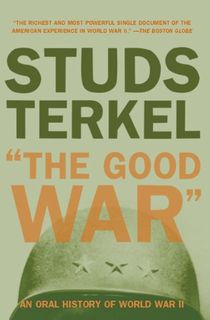
"The Good War"
Studs Terkel is well-known for his oral histories, especially Working, which was later made into a musical by Stephen Schwartz. Here, Terkel relives one of the most destructive wars in history though interviews with soldiers, sailors, and civilians alike. He presents accounts from people on both sides of World War II.
Published 40 years after the war, this retrospective history won a Pulitzer Prize. Providing unfiltered accounts from those directly affected by the war, both at home and on the front lines, Terkel allows the reader to experience what it truly meant to live through every facet of World War II.
Further Reading: 21 Essential World War II Books That Examine Every Angle of the Conflict
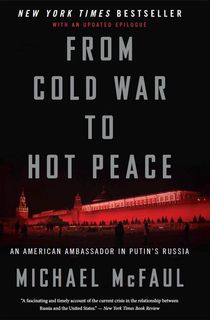
From Cold War To Hot Peace
Although the Cold War was not, technically speaking, an American war, it nonetheless helped shape the nation that exists today. This crucial account of our relationship with Russia comes from one of America’s leading scholars of the country, who also served as U.S. ambassador to Russia during the Obama administration. McFaul provides an inside look at U.S.-Russia relations over the last 30 years.
The unconventional structure of his book (a mixture of memoir, narrative history, and analysis) mirrors the unorthodox frame of Russian government. The book navigates the fall of the Soviet Union to the rise of the paranoid President Vladimir Putin. McFaul’s narrative allows the reader to gain some perspective on U.S. involvement in Russian democracy, from our role in the fall of the Soviet Union to our brief interest in Russian democracy through our present-day relationship with Russia. McFaul highlights America’s failure to foster peace in Russia and critiques its support in economic reform after the end of the Cold War. Amongst the accomplishments and failures of the relationship between nations, McFaul adds vivid descriptions about the main players.

The Korean War
Despite the fact that the Korean War was never officially declared an American war by Congress, this ill-fated conflict has quietly become one of the most influential in recent history.
This insightful guide to the Korean War includes detailed narratives of key battles alongside personal stories of civilians. Hastings, a military historian, takes us back to the bloody struggle to restore South Korean independence after the Communist invasion in June 1950. He uses accounts from overseas veterans and people dealing with the crisis at home. Despite many limitations, the Chinese would find themselves victorious while American troops were “under-strength, under-trained, and under-equipped.”
MacArthur’s outsized role is subjected to particular scrutiny, as the general’s desire to be the key decision-maker was often prioritized over actually making the correct decisions. The book also tries to make sense of the moral ambiguity of the Korean War. If you’re searching for a book that is heavy on analysis, look no further. Hastings’ writing is strong and vivid even as he covers all of the important events and people that were part of the war that left many Americans disillusioned.
Further Reading: 8 Powerful Korean War Books that Capture the Conflict
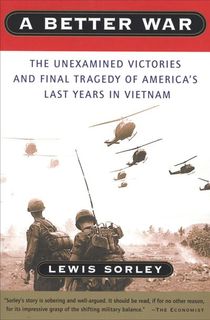
A Better War
The interminable conflict that was the Vietnam War is often seen as a travesty, but historian Lewis Sorley is ready to highlight new discoveries and perspectives. A Better War presents American achievements that were never acknowledged; Sorley uses thousands of hours of tape-recorded meetings between American military officials in Vietnam as evidence.
Documented history proves that the final years in Vietnam played out far differently than portrayed. While the war was being lost at the peace table and in Congress, soldiers were actually winning it on the ground. This superb book reexamines the untold victories of American soldiers in Vietnam.
Further Reading: 9 Fascinating Vietnam War Books

Baghdad Burning
There is a big difference between talking about war and living it. This book offers a unique look at the experience of living in a war zone and the personal aftermath those affected must face.
Baghdad Burning is a collection of blog entries from an Iraqi blogger that began reporting her experiences as a civilian observer in Baghdad. Eyewitness accounts are presented unfiltered with a fresh analysis. Going by the name Riverbend, the writer opened up daily about the political and personal effects of the war in Iraq and the ways it has impacted her family, her rights, and her freedom. This eye-opening account will leave you wondering just how the United States decided to declare war in Iraq in the first place.
Further Reading: 8 Thought-Provoking Iraq War Books

The Dark Side: The Inside Story of How the War on Terror Turned into a War on American Ideals
The aftershocks of September 11th, 2001 continue to shape American society. A culture of chaos and fear left a power vacuum, soon filled by those who would shape policy to their own benefit. Vice President Dick Cheney and adviser David Addington were key players in reshaping American society to a degree never previously known in history.
The Dark Side takes readers inside the excesses of the Bush administration’s war on terror. In the name of safety, Constitutional protections were obliterated and treatment of captured enemies shifted, with a long-lasting effect on the powers of the executive and legislative branches of the U.S. government. Mayer chronicles specific cases from the Bush administration, linking seemingly minor events to their unfortunate outcomes.
Featured photo: Stijn Swinnen / Unsplash




